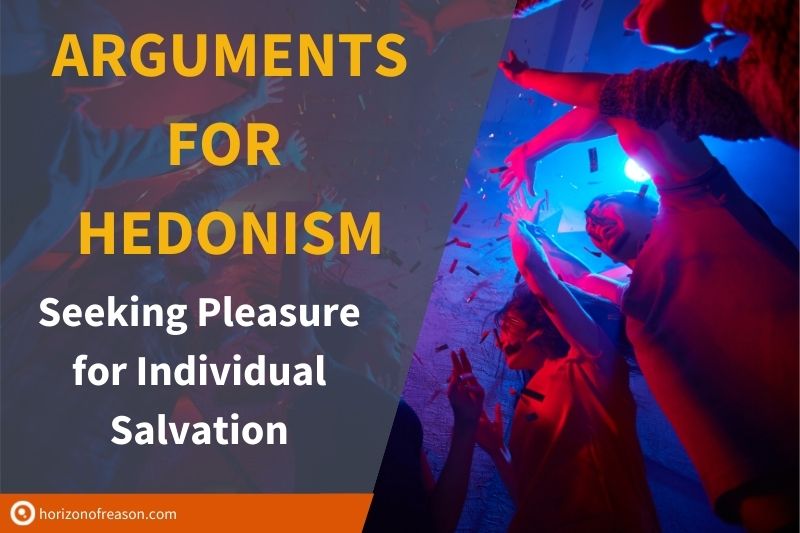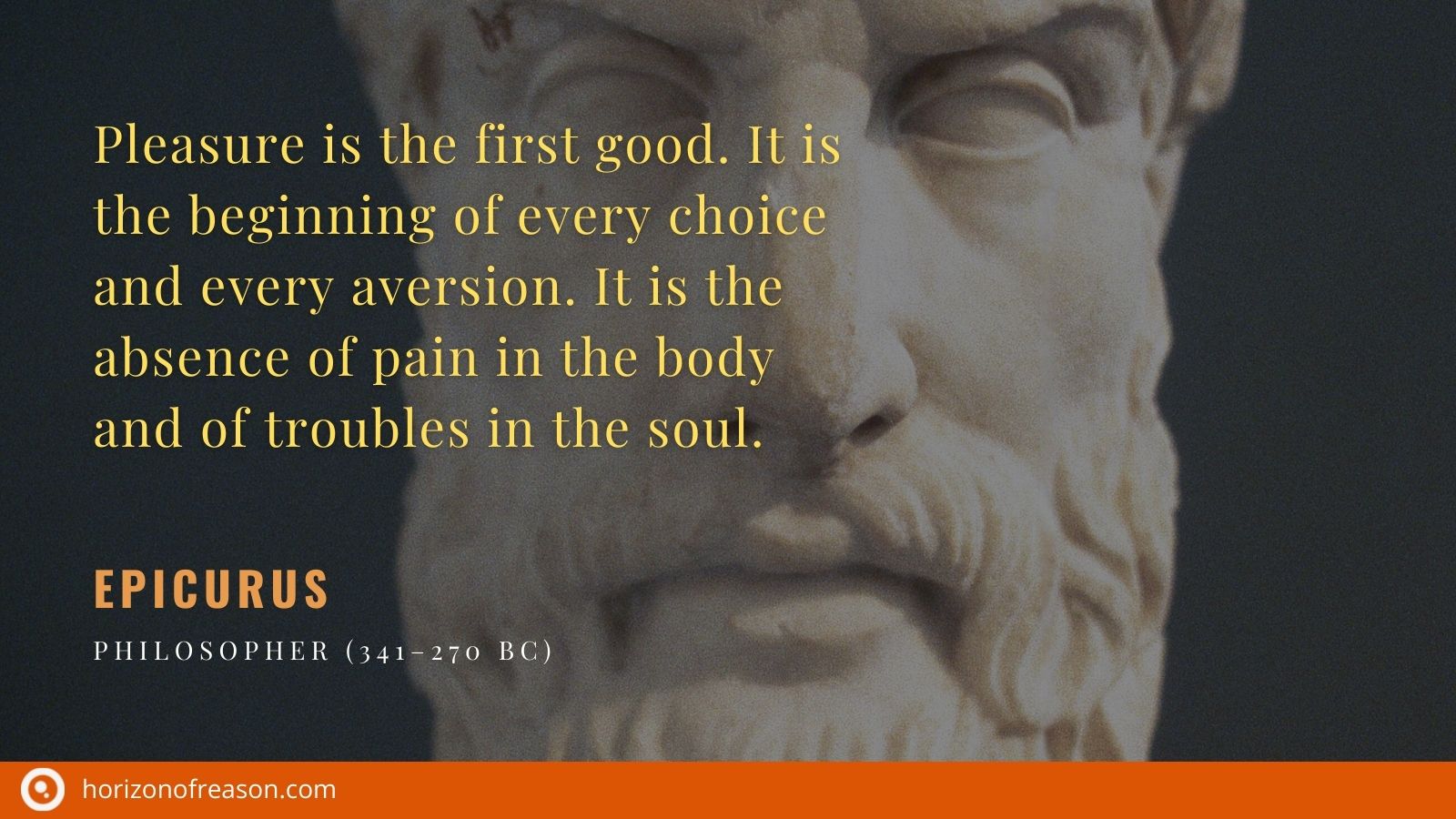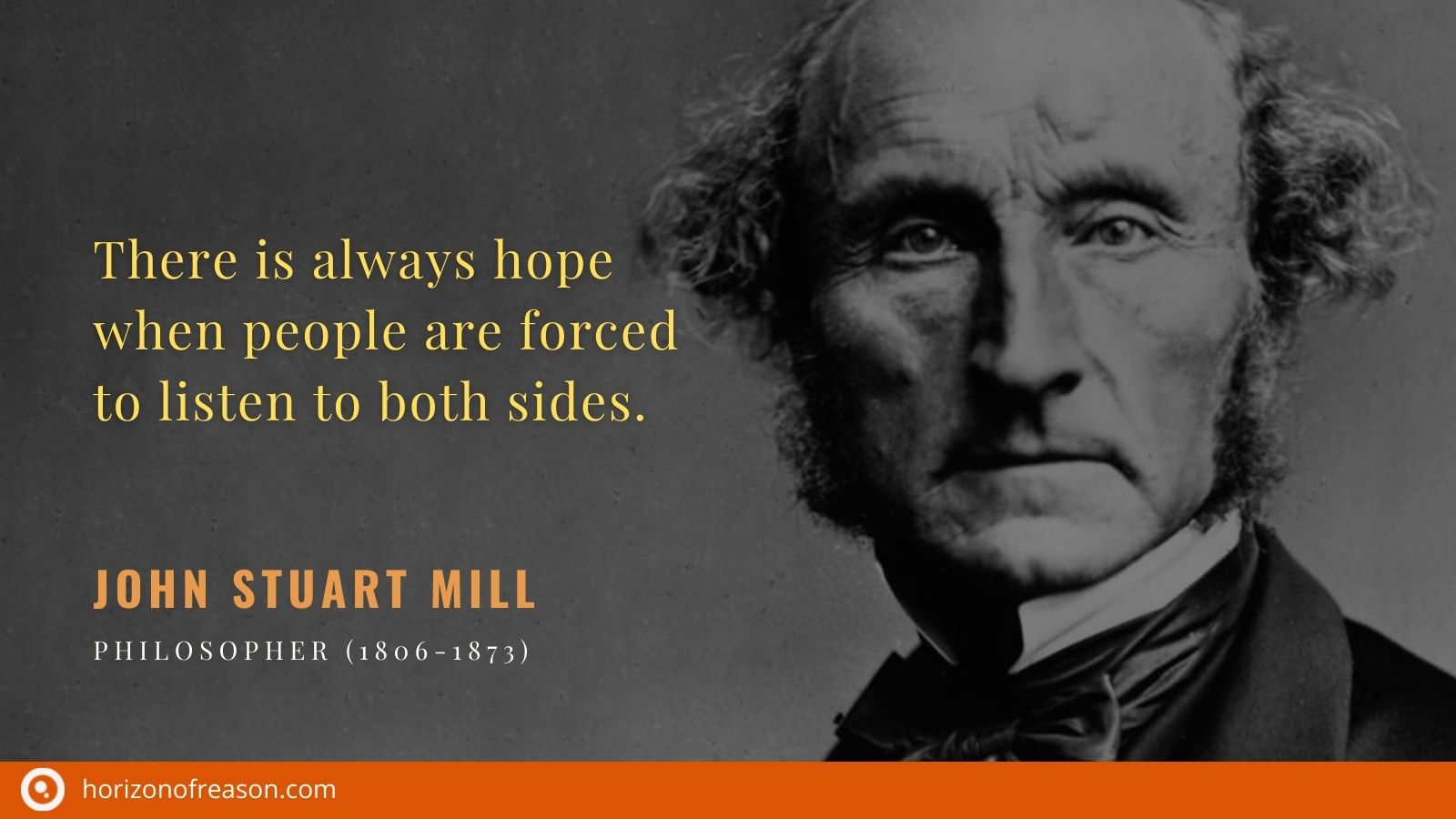
Arguments for Hedonism: Pleasure for Individual Salvation

Peter Prevos |
3095 words | 15 minutes
Share this content
The word hedonism conjures up images of excess and debauchery. The original meaning of this word lies, however, in the in-depth philosophical arguments for hedonism of the ancient Greeks and Romans.
This paper discusses arguments for hedonism and the role that Epicurus’ theory of pleasure plays in his moral philosophy; in particular, the role pleasure plays concerning his account of the reasons we have to be virtuous. The second part of this paper contrasts John Stuart Mill’s theory of pleasure with the Epicurean view.
Epicurean hedonism is preferable over the Millsean version, because Epicurean hedonism focuses on individual salvation, while Mill promotes the aggregated good of all, which does no justice to the individual.

Epicurean Hedonism
Hellenistic ethical theory revolves around the notion of the most final good. This concept originates with Aristotle who argues that if our pursuit of the good is to make sense, there must be a most final good, which he calls the goal or telos of living.1
A good is most final if we chose for its own sake and not for the sake of anything beyond itself. Two other constraints that Aristotle puts on the highest good is that it is to be self-sufficient and most desirable or most choice worthy. The Hellenistic philosophers add another constraint to the final good in that it has to be natural. The Epicureans claim that pleasure or hêdoné (ἡδονή) passes all these tests.2
What Epicurus means by pleasure is not transparent. In one passage, Epicurus writes that he does not know “how to conceive the good apart from the pleasures of taste, sexual pleasures, the pleasures of sound and the pleasure of beautiful form.” 3
Elsewhere, however, Epicurus comments that pleasure is not “drinking bouts and revelry, not sexual love, not the enjoyment of the fish and other delicacies of a luxurious table …”. The problem is that ‘pleasure’, as a translation of hêdoné, gives a misleading impression of Epicurus’ ideal. No English word provides a satisfactory translation of the philosophical concept of hêdoné and it seems that the least confusing alternative is to stick to the word ‘pleasure’.4
The Epicureans believe that philosophy cannot provide logical reasons for the claim that pleasure is a good thing. Cicero—through his spokesman Torquatus—points out that children and animals all pursue pleasure and avoid pain as soon as they are born; before any philosophical teachings have corrupted their minds. The Epicurean beliefs that the idea that pleasure is good is “sensed just like the heat of the fire, the whiteness of snow and the sweetness of honey, none of which needs confirmation by elaborate arguments; it is enough to point them out …”.5
The reason Epicureans refer to the natural state of humans and animals to argue that pleasure is good is that they believe that the appearance of design in nature is the product of an evolutionary process, without divine interference.6 We are not ‘designed’ to find pleasure attractive, we are genetically inclined to pursue it, and that is all there is to it to the Epicurean. The argument is that achievement of a state that we seek by our very natures, our genetic dispositions, can only count as flourishing or eudaimonia, and can thus only be good.
Stoic philosopher Zeno disputes the Epicurean justification that pleasure is good by claiming that they have misinterpreted the empirical data. He argues that ‘an animal has self-preservation as the object of its first impulse’ and not pleasure.7 One might also object to the Epicurean by arguing that their justification for pleasure being good is a naturalistic fallacy—the view that it is wrong to deduce an ought from an is.
Although this line of argument is strictly speaking not a fallacy (there is no error of logic), animal behaviour and ‘uncorrupted’ human behaviour is not necessarily a solid foundation to determine how we should behave. Moral rules can also be inferred from the competitive and aggressive behaviour of animals and children. Friedrich Nietzsche does, for example, precisely this: “No act of violence, rape, exploitation, destruction, can be ‘unjust’, in as much as life is essentially violent, rapacious, exploitative, and destructive and cannot be conceived otherwise.” 8
In Hedonism, pleasure is not just one good among many, but it is the only thing which is good in its own right and not sought for the sake of anything further; the telos of living. Epicurus’ defence of pleasure as the only most final good is brief. Cicero quotes Epicurus saying that he challenged anyone to name something that is sought for its own sake, and not for the sake of anything further, but isn’t pleasure. The challenge posed by Epicurus can most certainly be met, although Epicurus dismisses in advance all those who think that virtues and wisdom are the highest good. Epicurus’ reply to those that “babble on about virtues and wisdom”, as the most final good, is that they “will be speaking of nothing except the way in which … pleasures … are produced”.9 He thus argues that virtues and wisdom are the causes of pleasure and not a goal by themselves.

Epicurus’ argument depends on his particular understanding of pleasure. Pleasure can be thought of as a kind of feeling in itself, or as a way in which we experience feelings or activities. Happiness, in the latter sense, is not the result of feelings and actions, but inherent to it. In this case, it will be hard to argue that happiness is the highest good as it is a ‘side effect’ of being virtuous—an existential mode of being—and not chosen for its own sake. For pleasure to be the highest good, it must be a kind of feeling by itself because only then it can be the thing that is chosen for itself and nothing else.
Epicurus sees anxiety and pain as fundamental obstacles to happiness. No matter if you are rich and famous, you can not be happy if you are anxious to become more prosperous and famous. No matter how healthy you are, you won’t be happy if you are anxious about getting sick.
Political and economic power are in Epicurus’ view at best inessential and perhaps even detrimental to our efforts to lead a happy life. Baltzly characterises Epicurean ethical theory for this reason adunamatic, (a dumamis, without power).10
Epicurus claims that in some sense, freedom from pain, a condition he calls aponia, and freedom from anxiety, a condition he calls ataraxia, are as pleasant as life can get.11 This state of being without pain and anxiety is the best we can hope for because, as soon as the feeling of pain produced by want is removed, pleasure will not increase but can only be varied.
There are no surviving arguments by Epicurus himself for his claim regarding the limit of pleasure. Epicurus writes to Menoeceus that “we are in need for pleasure only when we are in pain because of the absence of pleasure, and when we are not in pain, then we no longer need pleasure”.12 Epicureans, therefore, call all removal of pain—over a certain period —pleasure. It follows from this line of reasoning that when we reach the state of aponia and ataraxia, no further removal of pain is possible and we have achieved maximum pleasure.
One objection against this argument is that certainly not all pleasure involves the removal of pain, as listening to pleasant music or smoking an aromatic cigar provides enjoyment but does not remove any pain. Another objection is that it is contrary to common sense that the possible amount of pleasure is limited, as it would seem that there is no theoretical end to pleasurable experiences. The common-sense view is that all removal of pain and anxiety is only the beginning of pleasure. Epicurus has two reasons to believe that pleasure is limited:
- The only unlimited thing is the void. No human life can contain unlimited pleasure since we are finite creatures and the finite can not contain the infinite;
- The good for man must be natural. It would thus be absurd to identify happiness with a condition which is impossible for humans to attain, as it would take an infinite amount of time to reach that state.
A solution to the problem of the limit of pleasure can be found in the distinction between kinematic and static pleasures. Epicurus writes that ‘freedom from disturbance and absence of pain are static pleasures (katastêmatikaí hêdonaí); but joy and delight are regarded as kinematic activities (Kínêsin enérgeiai) Static pleasures are considered the highest good by Epicurus because they are the result of our striving for painlessness and freedom from anxiety.
Epicurus subordinates kinematic to static pleasure, albeit not eliminates it as a means to a pleasant life. When we reach the state of being without pain and anxiety, kinetic pleasures can not take away pain, since there is no pain to take away. They can not do anything to increase the pleasure we feel, only vary it. Rist argues that it follows from this that if the whole human being is enjoying complete static pleasures, his or her pleasure can not be increased. Kinematic pleasures will thus not increase happiness beyond the absence of pain but only prevent pain from interrupting the static pleasures. The distinction between the static and kinematic pleasures also provides a solution to the seeming uncertainty in what Epicurus means with pleasure, as outlined above. From this perspective, his seeming contradicting statements make a lot more sense.
Epicurus claims that we all have good reason to acquire the moral virtues, such as courage self-control, justice and wisdom, although they are not the highest good. The virtues are, according to Epicurus, “naturally linked with living pleasurably and living pleasurably is inseparable from them”. The value of virtues Epicurean hedonism is purely instrumental. Being courageous and just is no part of being happy. Having these character traits is merely a good strategy for achieving happiness.
Epicurus claims that it is impossible to live a pleasant life without virtue. This claim does, however, not seem to be conceptually valid because it is not unthinkable to achieve happiness through acting immorally. We can, for example, imagine living the life of Ronnie Biggs, the famous train robber. He has lived an enjoyable life for many years in Brazil from the loot of his robbery.
The Epicurean would nevertheless argue that his life has not been pleasant, because he continuously had to look over his shoulder to avoid capture by the police. After 35 years on the run, Biggs finally surrendered to the police. He might have had a pleasant life for a while, but Epicurus would argue that the anxiety of being caught prevented Biggs from leading a joyful life. Epicurus’ claim is empirically correct because acting contrary to accepted moral behaviour will generally cause anxiety. Acting in this way will make our position within society challenging to maintain. It is a consequence of our nature as social beings that we can not live pleasantly without being virtuous.
John Stuart Mill
John Stuart Mill (1806–1873) argues that pleasure is a good in a similar way to Epicurus. Mill believes that pleasure is a good and that pleasure must be desirable because people desire it: “human nature is so constituted as to desire nothing which is not either a part of happiness or a means of happiness”.13 Mill concludes in the same way as Epicurus that people ought to desire happiness from the fact that people desire happiness. One objection against Mill’s reasoning is that we can not conclude with absolute certainty that, from the fact that some people desire happiness, everybody desires happiness and that the desire for happiness is thus the highest good.
Mill agrees with Epicurus that no proof can be given for the idea that pleasure is the highest good as “questions of ultimate ends do not admit to proof”. Mill seems to be making the point that if we suppose that pleasure is not a genuine good and genuinely desirable, then we would all be mistaken about what is genuinely good since we all seem to desire pleasure. This begs the question how likely it is that we are all mistaken about what we ought to desire. The foundation of Christian theology, for example, is based on the notion that we do not know what we ought to desire and that only through belief in Jesus we can reach salvation from our suffering.
Mill considers the objection that hedonism must be mistaken since we value other things than pleasure and happiness, such as virtue. Hedonists desire, according to Mill, “virtue and the absence of vice no less than they desire pleasure and the absence of pain …”. Mill maintains that not only is virtue to be desired, but also that it is to be desired disinterestedly, for itself. We can come to value a virtue like honesty in itself because of the role that it plays in promoting everyone’s happiness. When this happens, virtue becomes a part of happiness. By this he seems to mean that we take pleasure in being honest and are pained by the thought of being dishonest.

In Mill’s hedonism we are not all seeking our own individual happiness, but the happiness of all concerned. This implies that we all have to be “strictly impartial as a disinterested and benevolent spectator”, regarding our own happiness. Mill does not provide proof for his claim that we should strive for the happiness of all, except that “each person, so far as he believes it to be attainable, desires his own happiness”. It is, however, doubtful that from the fact that we each desire our own happiness, that it is therefore good to desire the happiness of all.
This line of reasoning can only be correct if happiness is a distinct property of humanity, similar to the fact that all gold atoms contain 79 protons in their nucleus. The idea that we should strive for the greatest happiness all is thus only correct if the argument that happiness is a good is valid. On the other hand, we could turn this line of thought around to argue that gold atoms are precisely that because they have 79 protons in the nucleus and that in the same way, being human implies by definition that we pursue happiness.
Mill needs to show that it isn’t rational for each individual to desire his or her own happiness without thereby desiring general happiness. Roger Crisp argues that Mill’s proof is unsuccessful and needs to be filled out with a number of assumptions.13 Mill seems to be assuming that his readers already believe that other people’s happiness is of practical relevance when he writes that ‘equal amounts of happiness are equally desirable’ and that the “truths of arithmetic are applicable to the valuation of happiness”.
Mill assumes that when aggregating happiness, the distinction between individual people is irrelevant. The greater the overall happiness, the greater the good. Mill’s hedonistic calculus requires an unnatural impartiality and ignores the importance of the concern one has for oneself and one’s friends and relatives.
Arguments for Hedonism
An important difference between the hedonist theories of Epicurus and Mill is the relationship between virtue and pleasure. Teleological ethical theories can be called perfectionist or liberal. The ethics Aristotle (eudaimonia) and Nietzsche (Übermensch) are perfectionist teleological theories because both are concerned with human flourishing. Epicurean hedonism, on the other hand, is a liberal theory because of the focus on satisfaction of desires.
Mill attempts to bridge the gap between the perfectionist and liberal teleology, although leaning towards a perfectionist teleology. The perfectionist strand in Mill’s hedonism is that virtue is an integral part of a happy life. Mill assumes an internal relationship between virtue and pleasure. The relationship between pleasure and virtue is, according to Epicurus, an external one; a relationship of cause and effect.
Both Epicurus’ and Mill’s hedonism are private moralities in that they investigate the highest good for the individual. Mill, however, attaches political and social consequences to his morality. Mill even states that the maximisation of the total sum of all happiness can be forced politically. Mill seems to sacrifice individual freedom for social responsibility when he writes that utilitarian morality considers “a sacrifice which does not increase, or tend to increase, the sum total of happiness”, as wasted.
Strict application of Mills theory can lead to problematic moral dilemmas. One could, for example, envisage a situation where it seems justified to kill one healthy person in order to save several others through organ transplantation. Epicurus’ answer would be that killing the donor to save two lives would cause anxiety in all concerned and is as such not conducive to a good life. Epicurus’ morality on the other hand is a purely individual path to a moral life. Although his solution seems at first glance to be narcissistic and self-defeating, the Epicurean focus on the state of aponia and ataraxia are possible the most important drivers for the continuing development of human culture. One could argue that our culture: technology, philosophy, religion and art, are an attempt to achieve a state of being without pain and anxiety.
Notes
Aristoteles, Ethica Nicomachea, (Amsterdam: Kallias, 1997), pp. 81–82, §1094a18–22.
Dirk Baltzly, Stoic and Epicurean Philosophy, (Churchill: Monash Distance Education Centre, 1998), p.6-7.
Diogenes Laertius, Lives of the eminent philosophers, (Harvard University Press, 1925), p. 535, §X.6.
J.M. Rist, Epicurus: An introduction, (Cambridge University Press, 1972), p. 101.
Cicero, On Ends 1.29, cited in: A.A. Long and D.N. Sedley, The Hellenistic philosophers, Volume 1, (Cambridge University Press, 1987a), p. 112, §21A(1–3).
Lucretius, De Rerum Natura, 5.837-77, cited in: Long & Sedley, p. 62, §13I.
Diogenes Laertius, The lives of eminent philosophers 7.85, cited in: Long & Sedley, p. 346, §57A(1).
Friedrich Nietzsche, ‘Zur Genealogie der Moral’, in: Das Hauptwerk, Volume IV, (München: Nymphenburger, 1990), p. 72.
Cicero, Tusculan disputations 3.41–42, Long and Sedley (1987a), p. 117, §21L.
Dirk Baltzly, ‘Adunamatic hedonism’, in: Dirk Baltzly, Dougal Blyth, and Harold Tarrant, editors, Power and pleasure, virtues and vices, (Polygraphia, 2001).
Epicurus, Letter to Menoeceus 127 and Key Doctrines 3, cited in: Long and Sedley (1987a), pp. 113–115, §21B(1–2) and §21C(1).
Epicurus, Letter to Menoeceus 128, cited in: Brad Inwood and L.P. Gerson, The Epicurus reader: Selected writings and testimonia, (Indianapolis and Cambridge: Hackett, 1994), p. 30.
John Stuart Mill, Utilitarianism, Liberty, Representative Government, (London: Dent, 1968).
Share this content


